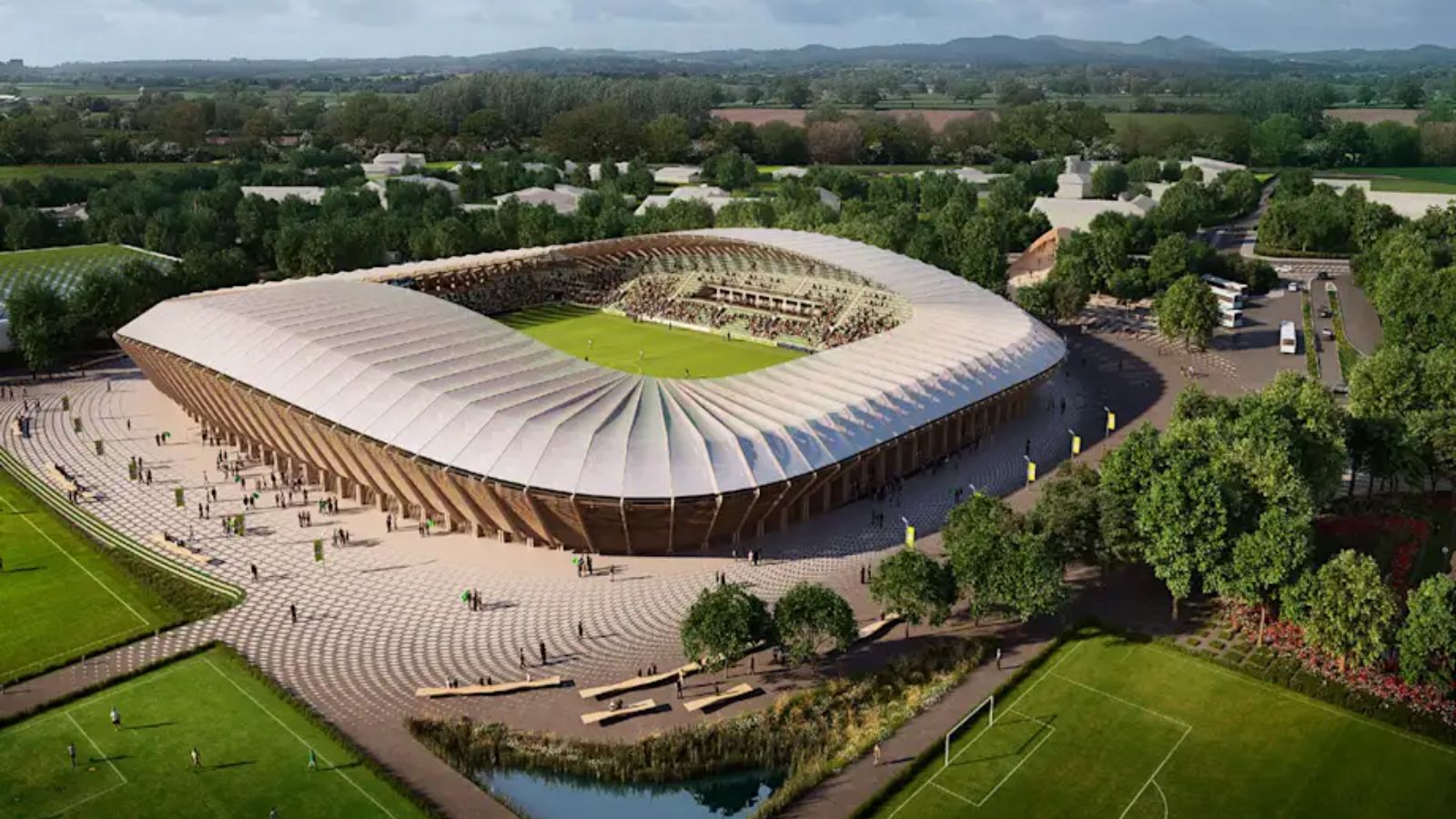When English football fans talk sustainability, most think of Forest Green Rovers as a forward-thinking curiosity.
But dig deeper and you uncover a club who are not just ahead of the curve but are building the stadiums of tomorrow with timber, turning cooking oil into biodiesel and shining a light on what club football can be.
Since green energy tycoon Dale Vince took over in 2010, Forest Green have evolved from a struggling fourth-tier side to a global icon of eco-football. It was in that same year that Vince banned red meat. As he confessed to The New Yorker: “I saw that and realised that made us part of the meat trade. We agreed on the spot that we’d take red meat off the menu.” And that was just the starting whistle.
By 2015, Forest Green had become the first fully vegan football club, accredited by The Vegan Society. Stadium staples like pies and burgers were reimagined as plant-based delicacies: think Quorn-and-leek or puff pastry filled with caramelised onion and asparagus. This bold switch was no stunt; food sales soared tenfold and attendances quadrupled as plant-powered passion took hold.
Beyond the menu, the environmental credentials are deeper still. The New Lawn, Rovers’ home stadium, has an organic pitch, treated only with seaweed spray and manually weeded, with no chemicals in sight. Mowing? A solar-powered robotic lawnmower, affectionately known as the ‘Mow Bot’, handles that, absorbing energy from panels on site. Rainwater is harvested and reused across the facilities, waste cooking oil is converted to biodiesel and electric-vehicle charging bays encourage fans to leave petrol behind.
These efforts did not go unnoticed. In 2018, Forest Green were officially recognized by the UN as the first carbon-neutral football club; FIFA labelled them the ‘world’s greenest football club’. They even earned a UN Climate Action Award in Poland, where Vince remarked, “Our experience with Forest Green Rovers proves football has a role to play in fighting climate change.”
Yet perhaps the boldest stroke of all is still on the drawing board. Eco Park, a new stadium in Eastington designed by Zaha Hadid Architects, is set to be ground-breaking. Official plans confirm it will seat around 5,000 fans and be constructed almost entirely from sustainably sourced timber – the first of its kind in world football.
The venue will generate over 80% of its energy on-site, using solar and wind power from Ecotricity; it will be surrounded by meadows, hedgerows and new woodlands to enhance biodiversity.
How bold is this? Well, Colin Peake, a club lifer, told BBC News the development “will make a massive statement to visitors” and said whoever runs the club “is just a temporary custodian…each and every one of us has to leave it in a better place for a future generation to enjoy”. Vince himself called it “the first (stadium) made almost entirely from wood which is beautiful, natural, durable and sustainable,” describing it as another step toward “the world’s greenest sports complex”.
Of course, the ambition doesn’t end with architecture. Eco Park will include subsidised match-day buses from nearby towns to cut car use, EV and bike charging, and pedestrian and cycle access linked to national routes.
The New Lawn itself features solar panels supplying roughly 20% of on-site energy, LED boards, rainwater recycling and even the innovative cleaning of white water from away fans’ toilets for pitch irrigation – it gives a whole new meaning to taking the piss out of the opposition!
Their green ambition pays dividends beyond the local community. Media outreach has been staggering – UN estimates suggest Forest Green reached nearly three billion people around the globe through local, national and international press.
So where does compost meet counter-pressing in all this? It’s everywhere. From seaweed feeding the turf to using grass cuttings for local compost, from bamboo kits and coffee-ground fibres in strips to solar panels backing electric team transport. This is not greenwashing. It’s genuine green action. When a club turns cooking oil into coach fuel, that’s football doing more than just talking.
Is it perfect? Probably not. Some fans grumbled when the vegan switch landed. But the resistance didn’t derail the mission. The benefits have become undeniable – on sustainability, on the scoreboard and in serving as a model for clubs throughout the pyramid.
Forest Green Rovers aren’t trying to tweak the edges of environmental policy; they’re bulldozing them. With Eco Park, they’re not just erecting a stadium – they’re planting one. It’s bold, it’s brash and it’s brilliant. They’ve taken a 135-year-old Cotswold club and turned it into the greenest team on Earth.
Wooden stadium? Compost-fuelled biodiesel? Vegan pies that outsell their meaty predecessors tenfold? This isn’t PR fluff. It’s a blueprint for football’s future. And Forest Green Rovers don’t just dream green – they live green.
To learn more about Pledgeball and how you can pledge to help your club shoot up the sustainability standings, visit Pledgeball.org.



